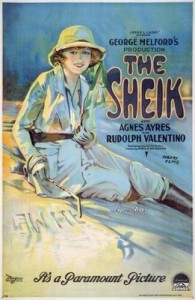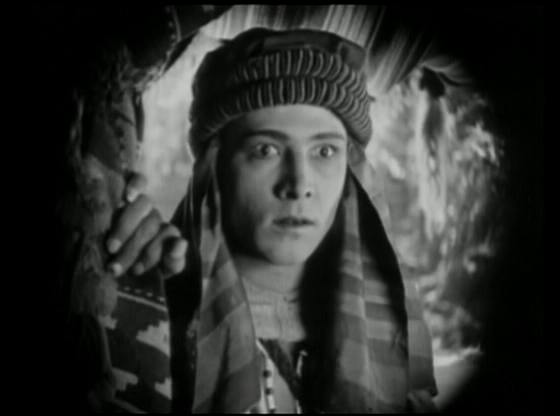|

Synopsis:
While touring in the Middle East, an adventurous white woman (Agnes Ayres) is abducted by an Arabian sheik (Rudolph Valentino) who insists he can force her to love him. Soon her anger begins to melt, especially when she faces an even worse fate at the hands of an evil bandit (Walter Long).
|
|
Genres, Themes, Actors, and Directors:
- Adolph Menjou Films
- Cross-Cultural Romance
- Kidnapping
- Middle East
- Rudolph Valentino Films
- Silent Films
Review:
Silent-era heartthrob Rudolph Valentino is, unfortunately, most closely associated with his title role in this horribly dated, incurably offensive “romantic adventure” taking place in the Middle East. The film starts off with refreshingly feminist overtones, as we’re introduced to the intrepid Lady Diana, who refuses to be bullied by anyone, or to take no for an answer — but her role is quickly degraded into that of a female victim who (in classic Stockholm-Syndrome style) eventually comes to love her captor. Meanwhile, Arabian culture (which, naturally, is conflated and homogenized here) is presented in both a patronizing and disrespectful fashion: “Where the children of Araby dwell in happy ignorance that Civilization has passed them by”, one early inter-title informs us; Arab women are either brides being sold on the market or dance-hall girls.
Naturally, you could argue that such culturally insensitive perspectives were par for the course at the time, and that one shouldn’t judge a film on the merits of the social climate within which it was made. With that said, then, how enjoyable is The Sheik on other accounts? Sadly, not very. Valentino’s performance is laughably one-note (his leering grin and arching eyebrows are a caricature of silent-era over-emoting), and the arrival of Adolph Menjou on the screen as Valentino’s long-time friend (a noted author) does little to alleviate one’s irritation at the offensive central storyline. Apparently this film’s sequel, Son of the Sheik (Valentino’s final role), is much better on many counts — so I’ll look forward to reporting back once I’ve seen it.
Redeeming Qualities and Moments:
- A glimpse at Valentino in his most iconic role

Must See?
No, though it’s worth a one-time look simply for its status as Valentino’s signature role. Listed as a film with Historical Importance in the back of Peary’s book. Available for free viewing on www.archive.org.
Links:
|


One thought on “Sheik, The (1921)”
Not a must – mainly for reasons brought out in the assessment, but that’s not all.
First time viewing.
Mostly, ‘The Sheik’ is a bore and, today, stands clearly as what passed as entertainment in the early ’20s. It does not particularly hold a firm place in cinema history, since it seems it was designed (though perhaps not consciously) as something more disposable.
Valentino made plenty-a-heart throb, but he’s no great shakes as a sheik or an actor. (I’m not that familiar with him on-screen, so I’d have to see whether he fares better elsewhere or was simply a sex object that made women swoon.)
Nobody else registers much here either (though it’s slightly interesting to see Menjou much more subdued than usual). Ayres is a bit broad too often – and becomes almost unwatchable once she falls for Valentino for no discernible reason.
Since the story leans toward silly exotic fantasy, we’re not left with a whole lot to place on a calling card. For decades, ‘The Sheik’ has been more famous for its title – and Valentino’s name on it – than anything else. It’s a chore to sit through…but I’m beginning to understand how Valentino’s legend would eventually have enough appeal for Ken Russell to fashion into a biopic.